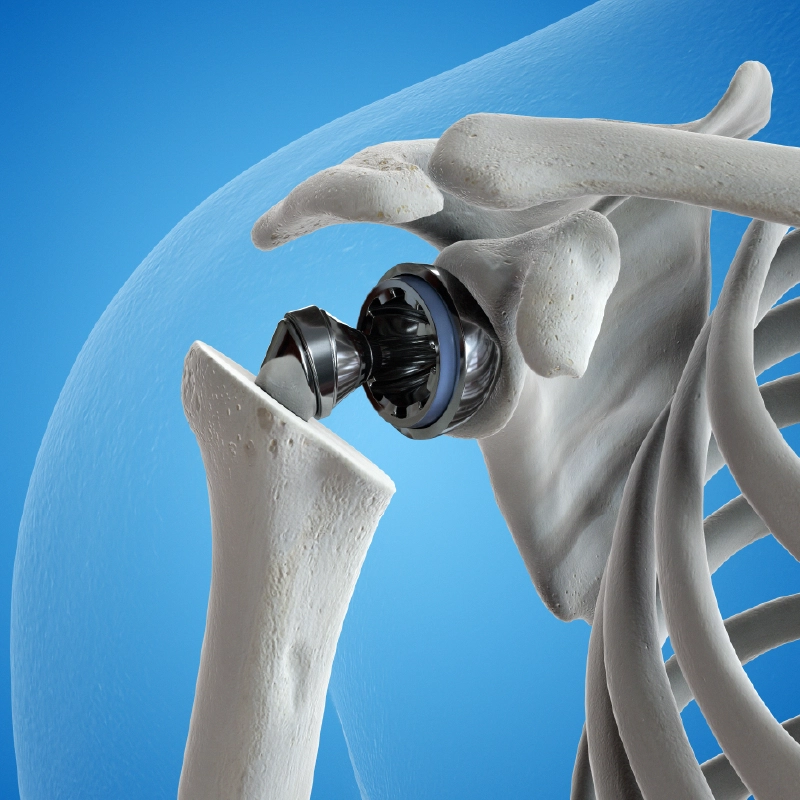
Shoulder replacement surgery, also known as shoulder arthroplasty, is a surgical procedure to replace the damaged parts of the shoulder joint with artificial components, typically made of metal, plastic, or ceramic. The shoulder joint is a ball-and-socket joint, where the head of the upper arm bone (humerus) fits into a shallow socket in the shoulder blade (scapula). The joint is covered by a layer of cartilage that allows smooth movement of the bones.
When the cartilage in the shoulder joint is damaged or worn away due to arthritis or injury, the bones can rub against each other, causing pain, stiffness, and limited mobility. Shoulder replacement surgery is performed to relieve pain, restore function, and improve the quality of life for people with severe shoulder joint damage. Consult with the best orthopedic surgeon in Bangalore to get to know the available treatment options before going for surgery.
Why is Shoulder Replacement Surgery Performed?
Shoulder replacement surgery is typically performed to relieve pain, restore function, and improve the quality of life for people with severe shoulder joint damage. Some of the most common reasons for performing shoulder replacement surgery include:
- Osteoarthritis: This is a degenerative joint disease that can cause the cartilage in the shoulder joint to wear away, resulting in pain, stiffness, and limited mobility.
- Rheumatoid arthritis: This is an autoimmune disorder that can cause inflammation in the shoulder joint, leading to pain, swelling, and stiffness.
- Rotator cuff tear arthropathy: This is a condition that can occur when a large rotator cuff tear causes the ball of the upper arm bone to move upward and rub against the acromion bone, causing pain and limited mobility.
- Post-traumatic arthritis: This can occur after a severe shoulder injury, such as a fracture or dislocation, that damages the cartilage in the joint.
- Fractures: Fractures of shoulder ball and arm bone with severe comminution in elderly people with poor bone stock.
Shoulder replacement surgery can help improve mobility and reduce pain for people with severe shoulder joint damage.
Types of Shoulder Replacement Surgery
There are several types of shoulder replacement surgeries, each with its own advantages and disadvantages. The most common types of shoulder replacement surgeries include:
- Total shoulder replacement: This involves replacing both the ball and socket of the shoulder joint with prosthetic components. Total shoulder replacement is commonly used to treat severe osteoarthritis, rheumatoid arthritis, and rotator cuff tear arthropathy.
- Partial shoulder replacement: This involves replacing only the ball of the shoulder joint with a prosthetic component. This replacement is used to treat severe fractures of the upper arm bone or humerus in relatively young patients (50 - 70 years).
- Reverse total shoulder replacement: This involves reversing the positions of the ball and socket of the shoulder joint, which can help compensate for damaged rotator cuff tendons. Reverse total shoulder replacement is used to treat severe rotator cuff tear arthropathy or failed previous shoulder surgeries and proximal humerus fractures in elderly patients with osteoporosis.
The Procedure
During the procedure, the surgeon removes the damaged parts of the shoulder joint and replaces them with prosthetic components. The new components may be cemented or press-fit into the bone.
The procedure of shoulder replacement surgery may vary depending on the specific type of surgery being performed and the patient's individual condition. After the surgery, the patient is taken to a recovery room for monitoring. Pain medication and antibiotics may be given to manage pain and prevent infection. The patient may be asked to wear a sling or immobilizer for a period of time to protect the shoulder joint while it heals.
Once the patient has recovered sufficiently, physical therapy is typically prescribed to help regain strength, range of motion, and function in the shoulder joint.
Recovery after Surgery
Recovery from shoulder replacement surgery typically involves several weeks or months of rehabilitation to restore strength, range of motion, and function to the shoulder joint. Here are some tips for a smooth recovery:
- Follow your doctor's instructions: Your surgeon and physical therapist will give you specific instructions for postoperative care, such as how to care for the incision, when to start physical therapy, and when you can return to daily activities. It's important to follow these instructions carefully to ensure proper healing and avoid complications.
- Manage pain: Pain is common after surgery, but there are several methods for managing pain, such as prescribed pain medication, ice therapy, and relaxation techniques.
- Use assistive devices: A sling or immobilizer may be recommended to support the shoulder and help it heal properly.
- Attend physical therapy: Physical therapy is an essential part of recovery after shoulder replacement surgery. Your therapist will design an individualized program to help you regain strength, flexibility, and range of motion in your shoulder joint.
- Maintain a healthy diet: Eating a healthy, balanced diet rich in protein and nutrients can help promote healing and prevent infection. You can talk to your doctor about any dietary restrictions or recommendations.
Sakra World Hospital is one of the Centres of Excellence providing exclusive shoulder care services across the country. We have many success stories of our patients with shoulder replacement from different parts of the country and also from overseas.
If you have any concerns or questions regarding the procedure or recovery, you can reach out to the specialists at Sakra World Hospital, the best orthopedic hospital in Bangalore. They can provide guidance and support to help you with any concerns regarding shoulder replacement surgery.

